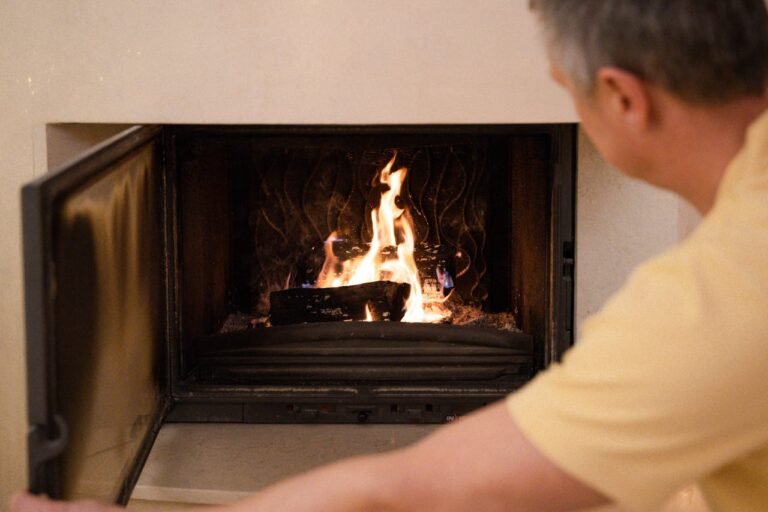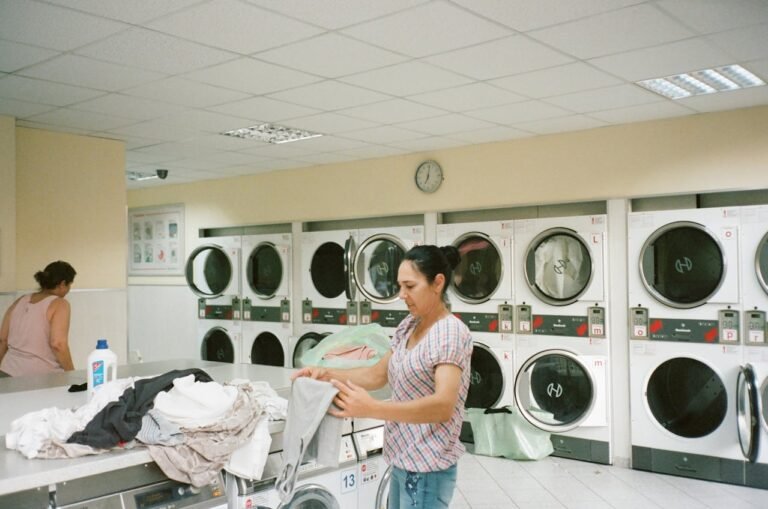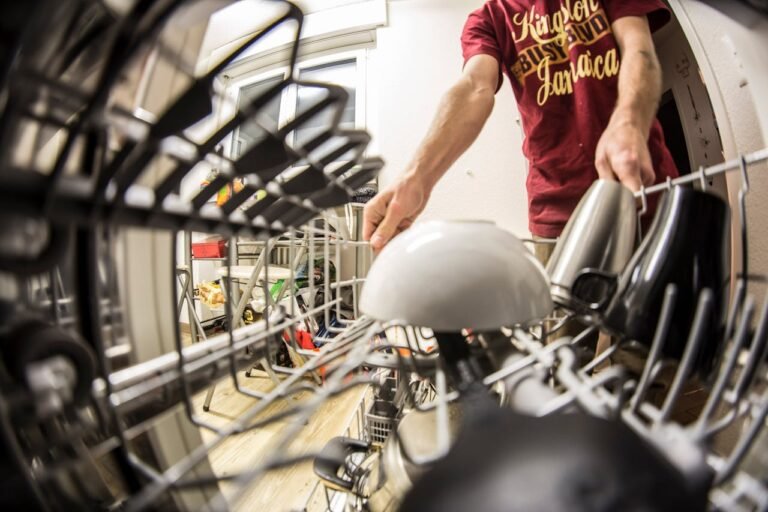10 Eco-Friendly Appliances You Need in Your Home
A sustainable lifestyle means being 100% committed to green living —whether it’s installing renewable energy sources, choosing green transportation options, recycling, supporting sustainable brands, or buying eco-friendly products. The list goes on.
In this article, we will discuss how you can transform your home into an energy-efficient living space with home appliances that help keep utility bills low. Whether you are upgrading your current appliances or buying for the first time, the best choice is to invest in energy-efficient appliances. Investing in sustainable home appliances not only benefits the environment but also helps reduce the cost of energy bills.
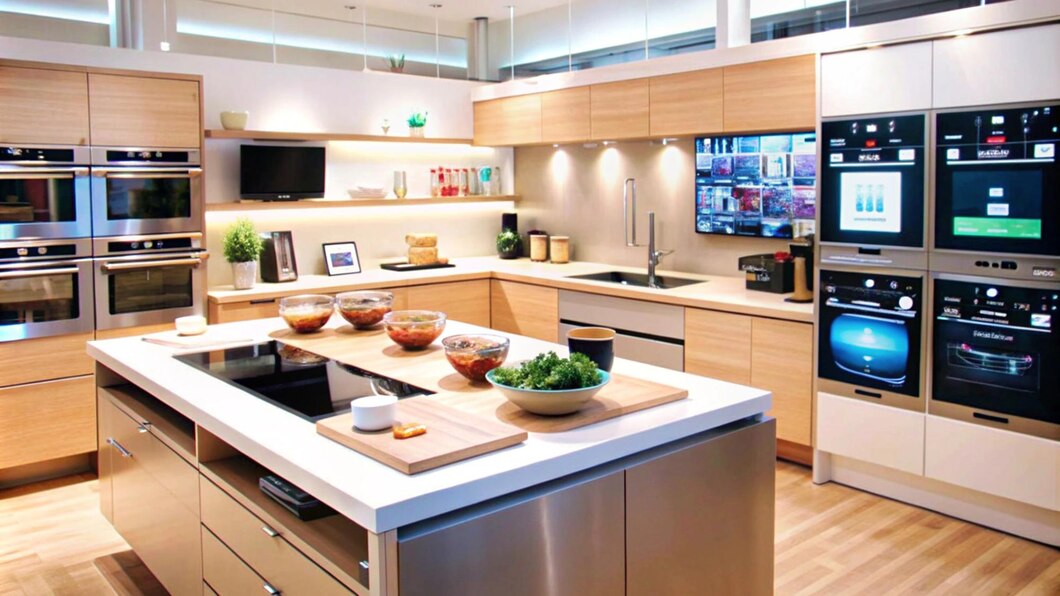
In This Article
- What Makes an Appliance Eco-Friendly?
- Why Use Eco-Friendly Appliances?
- Expert Insight: How Eco-Friendly Appliances Are Evolving
- Top 10 Eco-Friendly Appliances for Your Home
- #10. Frying Pans
- Conclusion
What Makes an Appliance Eco-Friendly?
Eco-friendly appliances are designed to use less energy, water, and materials compared to traditional appliances. These energy-saving devices are often certified by Energy Star and WaterSense, ensuring they meet high environmental standards.
Sustainable appliances help homeowners save money on utility bills by being durable, efficient, and longer-lasting than conventional products. We recommend investing in these appliances for any home upgrade or new project.
Why Use Eco-Friendly Appliances?
Eco-friendly home appliances ensure efficient use of resources and energy. They are designed to help you reduce your carbon footprint and the cost of utility bills. These innovations utilize cutting-edge technology to function optimally. According to a study, homeowners who upgraded outdated appliances with energy-efficient models can reduce their total energy consumption by up to 30%.
Dr Angela Collins, an environmental scientist who specializes in consumer habits explains that, “One of the most effective ways households can contribute to reducing their environmental impact is by upgrading to eco-friendly appliances. It’s a tangible action that, when done at scale, can make a significant difference globally.”
#1. Reduces Carbon Footprint
Eco-friendly appliances ensure the efficient use of energy and water, which directly reduces a home’s carbon footprint on utility bills. According to the U.S. Environmental Protection Agency (EPA), the average American home generates an estimated 8.1 metric tons of CO2 each year through electricity use. An upgrade to energy-efficient appliances would reduce the rate of CO2 emissions from energy consumption.
#2. Reduces Waste from Production
Sustainable home appliances are often made from recycled materials or are designed with the intent to reduce waste during production. LG and Whirlpool are two multinational electronics corporations that have developed sustainable manufacturing processes that cut down carbon emissions and waste production.
#3. Contributes to Water Conservation
Energy Star-certified kitchen appliances, such as dishwashers and washing machines are designed to use water efficiently. Investing in sustainable kitchen appliances is worth every penny, especially if you live in a region prone to droughts and want to save on utility bills.
Water scarcity is a pressing global issue affecting major cities worldwide. A study from the World Bank shows that water scarcity affects about 40% of the global population and this issue will only worsen unless sustainable measures are prioritized to mitigate climate change.
#4. Lowers Utility Bills
While investing in eco-friendly home appliances may have a higher upfront cost, the long-term benefits lead to significant savings on electricity and water bills. The Natural Resources Defense Council (NRDC) estimates that the average American home could save up to $100 annually by upgrading to Energy Star-certified products.
#5. Enhances the Value of Your Home
Energy-efficient homes are in high demand and homebuyers are willing to pay more for homes outfitted with sustainable appliances. According to Zillow, homes with eco-friendly certifications can sell for at least 9% more in value compared to conventional homes.
Learn More: Why Is Green Living Important? Benefits Your Life and the Planet
Expert Insight: How Eco-Friendly Appliances Are Evolving
Dr Sara Thompson is an environmental sustainability expert at the prestigious Hazard University. In her words “We are witnessing a pivotal shift in how consumers perceive their environmental impact. Eco-friendly appliances not only reduce energy and water consumption but also promote healthier living environments by minimizing the use of harmful chemicals in manufacturing and everyday use.”
According to Consumer Reports, eco-friendly appliances like Energy Star models consume about 10 to 15% less energy and water compared to standard appliances. As multinational electronics corporations advance in smart technology, future appliances are expected to become even more efficient, further minimising the carbon footprint in an average household.
Top 10 Eco-Friendly Appliances for Your Home
The home appliances listed below were selected based on their ability to conserve energy and water, helping reduce the carbon footprints of our homes.
#1. Electric Kettle
Modern electric kettles are designed not to consume too much energy, with many featuring automatic shut-off functions that stop heating once the water inside is heated to the desired temperature. According to Inside Energy, an electric kettle consumes 80% less energy compared to boiling water on a stovetop.
- Tip from an Expert: Here is some advice from Sarah Williams, a sustainability consultant “When shopping for an electric kettle, look for models with rapid-boil technology and insulated walls to retain heat, as these features further improve energy efficiency,”
Energy Savings: A standard electric kettle heats water faster than a stove. Research shows that an electric kettle takes an average of 2 to 5 minutes to heat water to a boiling temperature, while a traditional stove takes about 7 to 10 minutes.

#2. Blender
Blenders are more energy-efficient compared to large food processors. Blenders with energy-efficient settings can automatically turn off once the ingredients reach the desired consistency.
- Sustainability Note: The food jars of certain high-end blenders are now designed with eco-friendly materials like glass or recycled plastics.
Comparison with Food Processor: Blenders consume about 300 to 500 watts on average, while food processors can consume up to 1,200 watts. This means that a blender can help you save cost on utility bills.
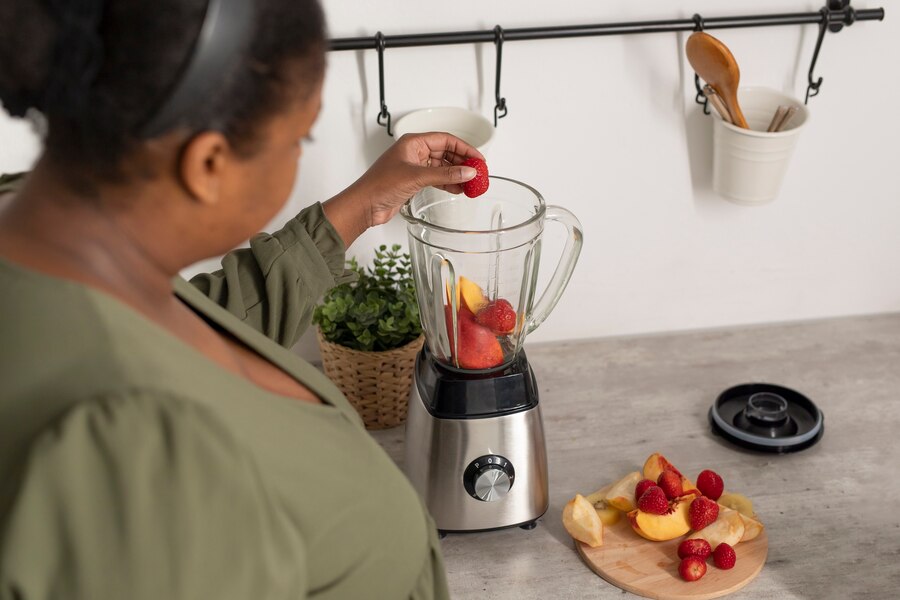
#3. Rice Cooker
Rice cookers are efficient and time-saving appliances you would love to invest in. They use less energy than cooking on a stovetop and are designed to switch off automatically or enter warning mode once the meal is ready.
- Avoid Teflon: Studies from Hazard T.H. Chan School of Public Health suggest that consumers should avoid using Teflon-coated rice cookers. The study recommends that the best rice cookers safe for use are those with stainless steel bowls.
Energy Efficiency: A World Bank document suggests that rice cookers can use as low as 0.5 kWh per use, while on average, a stovetop will consume about 1.5 kWh. With rice cookers, an average home can save up to 350 kWh in a year.
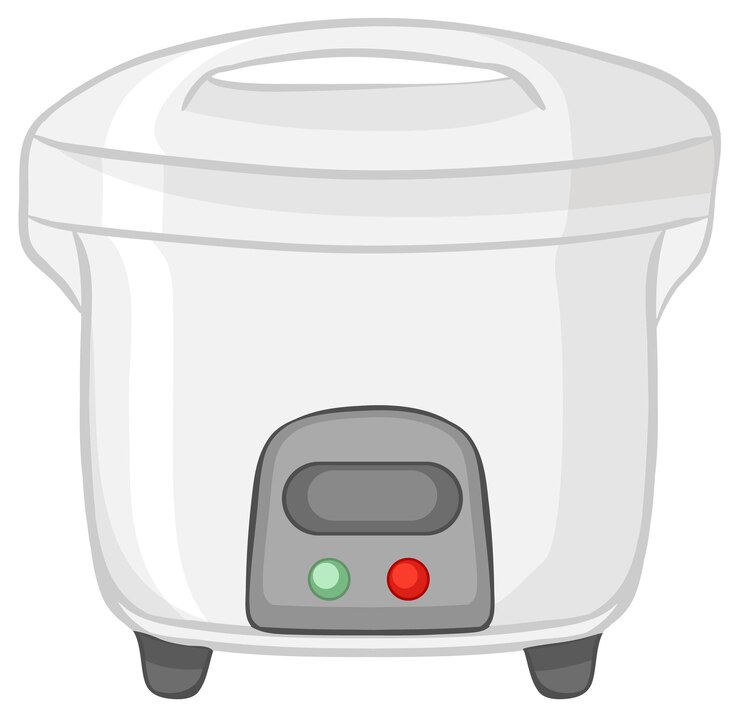
#4. Air Fryers
Air fryers are fast gaining popularity over traditional ovens, deep fryers, and toasters. These kitchen appliances do not require preheating but will cook meals in no time using hot air circulation.
- Energy and Time Savings: Air fryers can cook food 20 to 30% faster than traditional ovens. An article on WebMD suggests that air fryers use less oil than deep fryers, reducing fat and calorie content from food by about 70 to 80%.
Environmental Impact: Traditional ovens consume about 2,500 watts, while air fryers on the other hand use between 1,400 and 1,700 watts on average. Switching to an air fryer can significantly reduce your home’s energy consumption, including the cost of utility bills.

#5. Refrigerators
Old refrigerator models are known for their high energy consumption. However, new refrigerators with inverter technology are more energy-efficient. This technology adjusts the compressor speed based on cooling demand, which ensures efficient energy use.
- Energy Star Models: When purchasing a refrigerator, always look for refrigerators with an Energy Star rating. According to Energy Star, certified models consume 15% less energy than non-certified models. Upgrading to an Energy Star refrigerator can save you at least $50 per year on electricity bills.
Expert Insight: Mark Donovan, a home appliance expert, notes, “An old fridge can use twice as much electricity as a new, energy-efficient one. If you’re using a second fridge or freezer, reconsider the necessity, as reducing the number of appliances can significantly cut your energy consumption.”
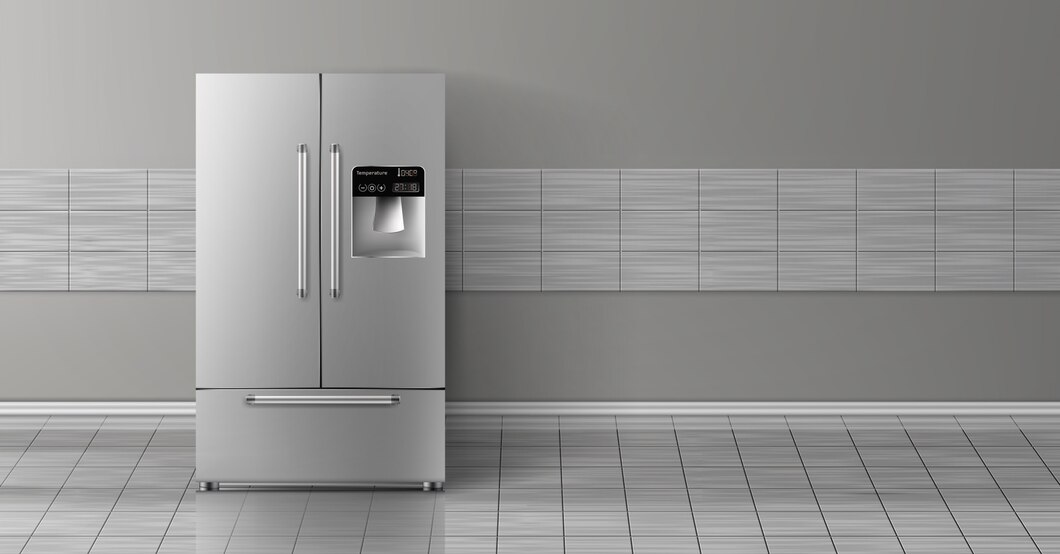
Learn More: Sustainable Approaches to Home Renovation and DIY Projects
#6. Induction Cooktop
Induction cooktops are highly efficient appliances that transfer heat to any cookware through electromagnetic induction. Compared to electric stoves, induction cooktops cook meals without losing much heat to the surrounding air.
- Energy Efficiency: An article published on Sustainable Westchester states that induction cooktops are about 84% energy-efficient compared to only 74% for electric stoves and 40% for gas stoves.
Best Features to Look for: Always choose models designed with auto-off features and precise temperature controls.
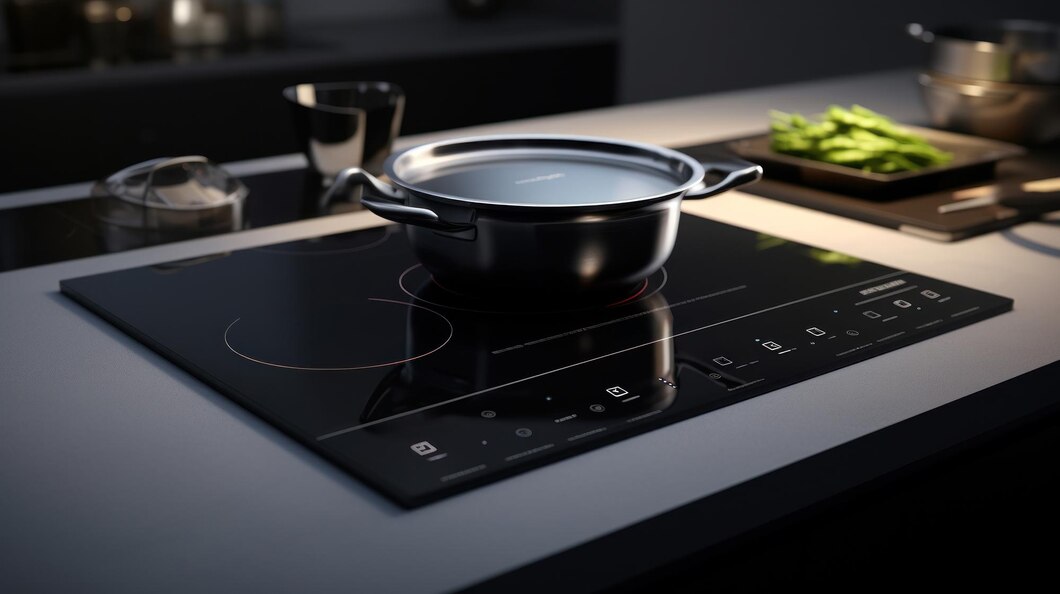
#7. Toaster
Toasters with fewer bread slots and energy-saving features like temperature control are highly efficient and the better option for your kitchen.
- Temperature Control: Energy-efficient toasters can adjust the power required for toasting based on the number of slices placed in the slots.
Expert Tip: Experts like Michael Bluejay, also known as “Mr. Electricity,” suggest when replacing an old toaster, or buying a new one, look for models that consume less than 900 watts. Small adjustments like this add up over time, especially in busy households.

#8. Electric Composter
Among eco-friendly appliances, electric composters are considered to be innovative devices that promote environmental sustainability. These composters make it easy to compost organic waste. They can transform your food scraps into rich compost in a few hours, effectively reducing the amount of food waste sent to landfills, and converting it into nutrient-rich compost for organic farming and gardening.
- Environmental Impact: According to the U.S. Environmental Protection Agency (EPA), food waste makes up an estimated 24% of landfill content in the United States. Owning an eclectic composter can significantly reduce food waste in landfills.
How it Works: Electric composters use about 1 to 2 kWh per cycle to process food waste into compost. These devices are perfect for households in urban environments with limited space for traditional compost bins.

#9. Dishwasher
Dishwashers with the WaterSense label are designed to function sustainably, using less water and energy. Modern dishwashers are more efficient than washing dishes by hand. According to the Natural Resources Defense Council (NRDC), a high-efficiency dishwasher can use about 4 to 6 gallons of water per cycle, while washing by hand can use up to 20 gallons.
- Water-Saving Technology: Look for dishwashers with a soil sensor that adjusts the water used based on how dirty the dishes are.
Cost Savings: According to My Florida Home Energy, an energy-efficient dishwasher can help households save at least $40 a year in utility bills.
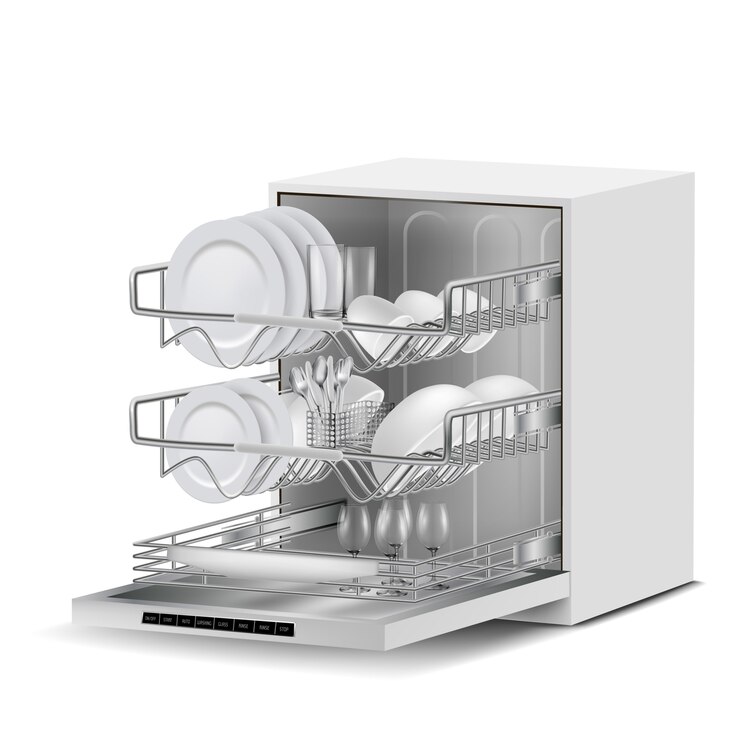
#10. Frying Pans
We finish this list with eco-friendly fraying pans—sustainable cookware for your kitchen. We strongly recommend you avoid non-sticky coatings like Teflon, which contains PFOA (perfluorooctanoic acid).
- Healthier Alternatives: Stainless steel, ceramic-coated or cast iron pans are safer and more sustainable than Teflon coating frying pans.
Environmental Impact: According to a study from the Environmental Working Group (EWG) Teflon coating pans, when overheated can release toxic fumes that affect human health. Look for sustainable alternatives like cast iron pans and stainless steel
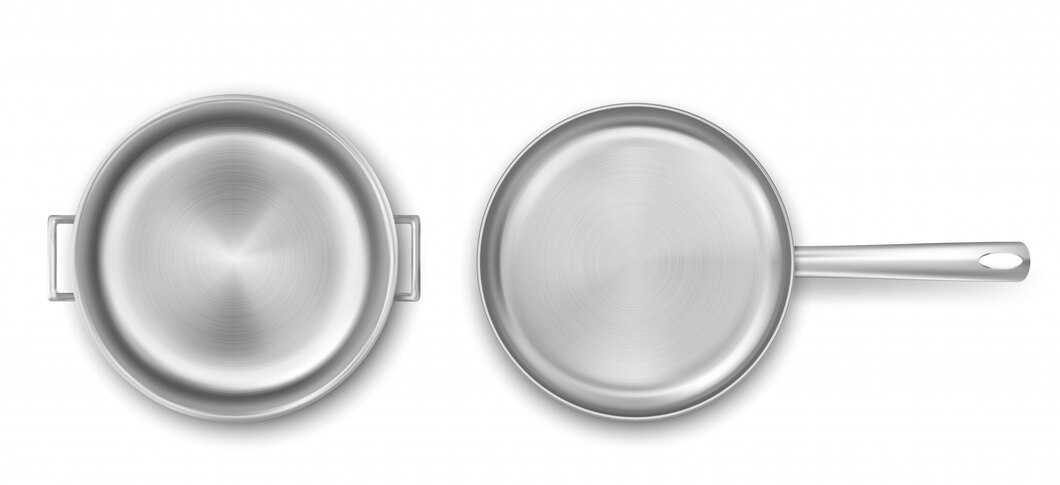
Conclusion
Eco-friendly home appliances are worth every penny because they are safer, conserve energy and water, and lower cost on utility bills. As multinational electronics companies continue to develop sustainable manufacturing processes, these appliances will only become more efficient.
Whether you are upgrading your home appliances or buying for the first time, investing in energy-efficient appliances is the best choice. Investing in sustainable home appliances benefits the environment while reducing the cost of energy bills.
Take Action Today
Start by upgrading old, energy-intensive appliances with sustainable models designed to save on utility bills. Always look for appliances with reputable certifications, such as Energy Star and WaterSense.
Your decision to choose eco-friendly appliances over conventional appliances can make a difference. As Dr Amory Lovins, co-founder of the Rocky Mountain Institute, has often said in many of his interviews, “Every small step toward energy efficiency compounds over time into significant benefits and helps to build a more sustainable future for all of us.”

